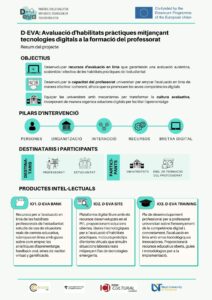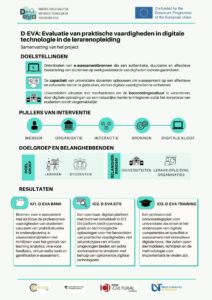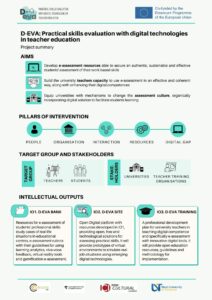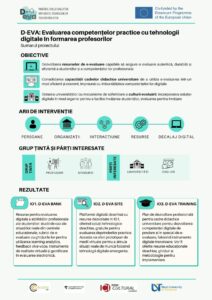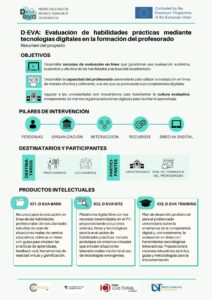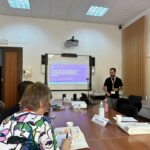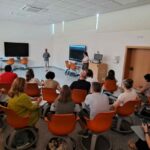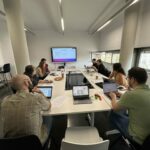The purpose of the project
D-EvA Practical Skills Evaluation with Digital Technologies in Teacher Education (2020-1-ES01-KA226-HE-095485) is an Erasmus+ project funded through SEPIE. D-EvA project seeks to develop innovative assessment practices in a digital era in the area of Teacher Education, aiming to support educator and educational leaders to improve their teaching and learning skills and bridging digital skills gaps of both students and academics in Higher Education.
According to recent studies (Digital Education Plan 2021-2027 in EU), the assessment system has been the most challenging aspect of a remote teaching and learning situation in the current pandemic crisis. Those assessment methods involving students’ practical skills which require a high level of interaction with others or with a work-based learning context are especially challenging.
The project aims to:
1) Develop e-assessment resources able to secure an authentic, sustainable and effective students’ assessment of their work-based skills;
2) Build the university teachers capacity to use e-assessment in an effective and coherent way, along with enhancing their digital competences;
3) Equip universities with mechanisms to change the assessment culture for good, organically incorporating digital solution to facilitate students learning.

What are we going to do?
The project is based on five pillars of intervention, creating a holistic and organic process around the following university dimensions:
1) People: Students are the central agent in HE so the development of their professional skills represents our main outcome and priority;
2) Organisation: the project will consider the context of intervention as critical as in any change and innovation process;
3) Interaction: Aspects such ethics and integrity will be placed in the centre of interaction designed;
4) Resources: The project will contribute to creating valid and adapted resources for teachers and university leaders;
5) Digital gap: The assessment must be inclusive for all students and our project will design resources and interventions which will contribute to reducing the teachers and students’ digital gaps.
Target groups
The direct beneficiaries are teachers and academic leaders in the field of Teacher Education, especially those involved in delivering teaching in work-related subjects such as practical workshops, school placements, internships, seminars. A total of 20 teachers in each will benefit from the project outputs (a total of 180) and more than 5000 students in Teacher education.
Phases of development
The project is carried out in 3 development phases corresponding to 3 intellectual outputs (IO).
Phase I, related to IO1
Resources for e-assessment of students’ professional skills: study cases of real-life situations in educational centres (school placements, internship centres, university subjects as Practicum); e-assessment rubrics with their guidelines for using learning analytics, viva-voce feedback, virtual reality tools and gamification e-assessment.
Phase II, related to IO2
Open Digital platform providing open, free and technological solutions for assessing practical skills. Platform will be developed by:
- Assessing and understanding the context and the current state
- Generating a number of ideas and reflecting back on all the generated ideas.
- Prototyping and testing as many ideas as possible in a short amount of time with minimal resources
- User testing
- Refining prototype
Phase III, related to IO3
A professional development plan for university teachers in teaching digital competence and specifically e-assessment with innovative digital tools. IO3 is to provide: Open Education Resources, guidelines and methodology for implementation, including guidelines for autonomous implementation in Teacher Education schools; online peer- coaching support plan.
Below you can see the infographics overview of our project in different partner languages.
Project details
Funding Entity: European Commission (Erasmus+ KA2)
Project coordinator: CRiEDO- Centre de Recerca i Estudis pel Desenvolupament Organitzatiu (Universitat Autònoma de Barcelona- Spain)
Project number: 2020-1-ES01-KA226-HE-095485
Duration: March 2021 to February 2023
Total budget: 279.550,00 €


